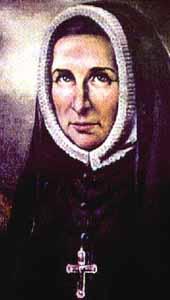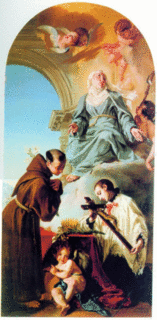
The 1700's were volatile years for France, as it waged war against the bourgeoisie in the name of 'freedom' and fought alongside those countries who were also struggling for their independence from Britain. It was France's support of the America's which would infuriate the British Government, as France willingly entered the war in 1778 by sending troops and other military aid to America to help the independents in its defiance of British rule.
But 1769 was to be a providential year for France as both Napoleon Bonaparte and Rose Philippine Duchesne were born. One was to bring untold tragedy upon the French people, as he grew to lust after power at any cost, while the other, Rose Philippine through her great Faith in God would become yet another Saint of France, this nation of tears.
Philippine began her life with ease as her Father was a prosperous business man and her mother was a devout Catholic. It was her mother Rose, who taught all her children a love for their Faith and fired their hearts with zealousness as she read them stories of the lives of previous Saints and martyrs, never knowing that one of her very own would one day become a Saint.
Philippine listened to all her Mothers stories with great attention and with her siblings she would re-enact the previous nights stories of Saintly heroism, during their play time. For Philippine was a born leader, and she thrived on hearing and then reading about these heroic Saints.
But being that Philippine was born into a prosperous family she was sent to school with the Visitation Nuns, where she thrived on its spirit of helping and educating the poor. It was then that she felt a calling to enter the Religious life, upon hearing this, her Father immediately withdraw poor Philippine from the school she so loved.
Philippine was saddened at such a response, but she did not give in and simply obeyed her parents till she came of age. During this time her education was not ignored as she was taught privately at home, excelling in many subjects.
Though Philippine was a model child, upon reaching maturity her independent spirit shone through and she rejected the attempts made by her father to marry her off to a man of suitable means. For Philippine still longed above all to serve her Lord through the Church and most especially the mission field.
But Philippine was to prevail and she entered the Religious Order of the Visitation Sisters at the age of 19. Unfortunately this broke the hearts of her parents and neither attended the ceremony of Profession, still Philippine would not be deterred.
But the French revolution would soon be upon them and during this great destruction Philippine did all she could to assist the poor in her area, despite the governing powers, who were trying to destroy the Church!
Sadly Philippines parents died during this period in time and left their daughter a substantial sum of money which helped her to distribute it to the sick and the poor. But it was in 1801 that Philippine once again re-entered the Order of the Visitation Sisters, once the blood lust of the mob had been sated, and the French revolution became a part of France's tragic history.
Though Philippine returned to her Order it was not the same as it had been before and it was with the intercession of Father Varin that led Philippine to the Order of the Society of the Sacred Heart, in which Mother Madeleine Sophie Barat welcomed her.
All through these troubling times Philippine kept a strong spirit of prayer and a love of solitude as well as a longing to help the poor. No matter the price Philippine was determined to pay it as she longed to be a Saint, not for any honour of self but to proclaim her love of God to all.
So it was that in 1818, Sister Philippine came to New Orleans to help Bishop Du Bourg. Upon settling down, Sister Philippine was then sent in a small group to Missouri, where she commenced to opening a school. These were interesting times as America was very different from her beloved France, its landscape was much harsher and less yielding. It took Sister Philippine time to adjust to this dramatic change in landscape and peoples.
But in every country the poor were everywhere, and Philippine was determined to help educate the dispossessed to become self sufficient. This was to produce a zealous and formidable workload where Sister Philippine seemed to be everywhere, opening orphanages, starting new schools in a never ending attempt to be of assistance to those who needed her help.
She worked diligently to improve the lot of the poor but also to try and help the Native Americans in the terrible injustices she would witness being perpetrated against them. Therefore Philippine also educated and trained Native American girls to help her in her mission hospitals and to help them establish a decent life for themselves.
And though born in the same year as Napoleon Bonaparte who tried to rule the world it was Rose Philippine Duchesne who ended up ruling the hearts of all those she came in contact with, in a spirit of mutual love and respect.
Rose Philippine Duchesne died in 1852.
Saint Rose Philippine was canonised in 1988 by Pope John Paul ll.
Quotes from St. Philippine Duchesne:
"Learn to let others do their share of the work. Things may be done less well, but you will have more peace of soul and health of body. And what temporal interest should we not sacrifice in order to gain these blessings?"
...." the dear Lord has favored us with a share of His cross. The greatest and undoubtedly the hardest to bear is the lack of success in our work here. If a saint had been in charge, all would have gone well. "
"You may dazzle the mind with a thousand brilliant discoveries of natural science; you may open new worlds of knowledge which were never dreamed of before; yet, if you have not developed in the soul of the pupil strong habits of virtue which will sustain her in the struggle of life, you have not educated her, but only put in her hand a powerful instrument of self-destruction."
"Humility is the virtue that requires the greatest amount of effort."
St. Philippine Duchesne
Peace of Christ to ALL
Copyright © 2005 Marie Smith. All rights reserved.

